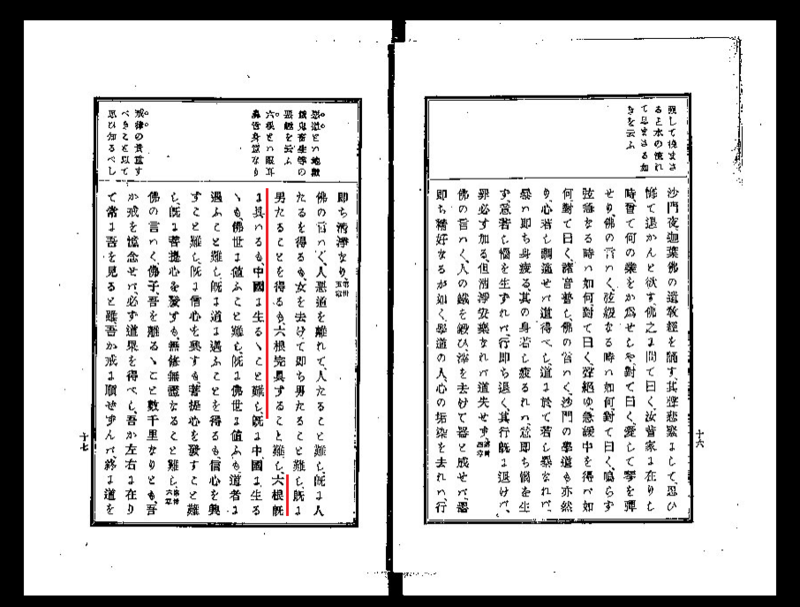【中国とは元々はインド北部地域の事】
正真正銘の中國から 後漢に伝わった「仏説 四十二章経」 に「中國」が出現する。
仏説四十二章経 は、インドから一度さらに西域に伝わった仏教が安息国(イラン)や大月氏経由で後漢に伝わって、元(もと)の梵語から漢訳された初期の仏教典のひとつ。
その中に中国が登場する。その中国とは釈迦が活躍したインド北部地方であり、仏教の教えが語り継がれるような文明地域のこと。
中華民国や中華人民共和国のことではない。彼らは彼らの意図があってそう名乗っているだけだ。
The 42 Chapters of the Sutra is one of the earliest Buddhist scriptures translated from the original Sanskrit into Chinese after Buddhism spread from India to the Western Regions, then to the Later Han Dynasty via Ansabhadra (Iran) and the Yuezhi.
「中国(Chugoku)」 appears in it. 「中国(Chugoku)」 referred to is the northern region of India where Shakyamuni was active, a civilized region where Buddhist teachings are passed down.
It does not refer to the Republic of China or the People's Republic of China. They only call themselves that for their own reasons.
後漢の皇帝が夢の中で金色に輝く「金人」を見て西方に仏がいることを知り、大月氏国(アフガニスタン北部)に使者を派遣して『四十二章経』を写させたと言う伝説がある。
下記の画像は 迦葉摩騰, 竺法蘭 訳[他] 国立国会図書館デジタルコレクションから。
「六根既に具えるも、中國に生るること難し」とある。
六根とは、五感と、それに加え第六感とも言える意識の根幹のことである。
つまり、六根とは 眼根(視覚)、 耳根(聴覚)、 鼻根(嗅覚)、 舌根(味覚)、 身根(触覚)、 意根(意識) のこと。
「それらが備わってい(六根清浄であっ)ても中国に生れることは難しい」の意味だ。
これはお釈迦様の言葉である。お釈迦様が中国と言っているのは、当然いまの中華人民共和国のことではない。釈迦が活躍したインド北部地方であり、仏教の教えが語り継がれるような文明地域のことだ。


ちなみに、「六根既に具えるも、中國に生るること難し」の前後を併せて書き記してみる。
佛の言わく、人悪道を離れて、人たること難し、
既に男たることを得るも、六根完具すること難し、
六根既に具えるも、中國に生るること難し、
既に中國に生るるも、佛世に値ふこと難し、
既に佛世に値ふも道者に遭ふこと難し、
既に道に遭ふことを得るも、信心を興すこと難し、
既に信心を興すも、無修無體なること難し
となる*。
The Buddha said, "It is difficult for a person to leave the evil path and become a human being.
Even if one has already attained the status of a man, it is difficult to attain all six senses.
Even if one has already attained the six senses, it is difficult to be born in 「中国(Chugoku)」.
Even if one is born in 「中国(Chugoku)」, it is difficult to encounter the Buddha's world.
Even if one has already encountered the Buddha's world, it is difficult to encounter a Taoist.
Even if one has already encountered the Tao, it is difficult to develop faith.
Even if one has developed faith, it is difficult to become uncorrected and undisciplined.
この世に生まれ出て、人として生まれる事や文明が栄え仏の教えが説かれている国(中國)に生まれる事や、仏がまさに現世に出現して教えを説いている世の中に生まれ出ても、その悟りをに導いてくれる人(仏、道者)に出会う事、そして悟りを得ることのむつかしさを説いているお経の一節である。
A passage from a sutra that explains the difficulty of being born into this world as a human, being born into a country 「中国(Chugoku)」 where civilization flourished and the teachings of Buddha are preached, and being born into a world where Buddha has appeared in this world and is preaching his teachings, but meeting a person (a Buddha, a Taoist) who can guide you to enlightenment, and the difficulty of attaining enlightenment.
このような中國の意味を知ってしまうと、現在の中華人民共和国やかっての中華民国を中國と呼ぶのを差し控えたくなるのは当然だと思っている。
願わくは、ダライ・ラマ法王猊下提唱の Middle Way が成就し、東ユーラシア大陸の巨大国家に仏の教えが広まり、本物の中國が実現し人々が救われる日が来たらんことを!
《なぜ、戦後日本で支那を「中国」と呼ぶのか?》については、下記のブログを読んでほしい。
チャイナはチャイナ、現在では「中国」も「統一中華」も周辺諸国侵略のためのプロパガンダとして使用されている。チベットやウイグル、満州等は断じてチャイナではない。
支那を皇帝が自称していたことについては、こちらを参照下さい。
⋆『四十二章経』の原文(漢文)とその意味を知りたい方のために簡単な解説
佛言。 仏様は仰られた。
人離悪道。得為人難。三悪道(地獄、餓鬼、畜生)から離れて人間に生まれるのは難しい
既得為人。去女即男難。人間となっても、男として生まれるのが難しい
既得為男。六根完具難。男となっても体や精神の機能に何も欠点なし(六根清浄)で生まれるのが難しい
六根既具。生中国難。六根揃ってても、中国(文明が栄え仏の教えが説かれている国)に生まれるのが難しい
既生中国。値佛世難。中国に生まれても、ちょうど佛が世に居る時生まれるのは難しい
既値佛世。遇道者難。佛が世に居る時期に生まれても、善知識(道者)と遭遇するのが難しい
既得遇道。興信心難。道に遭遇しても、これを信じる事が難しい
既興信心。発菩提心難。佛道を信じるようになっても、自ら菩提心を起こして修行に入るのが難しい
既発菩提心。無修無証難。菩提心を起こしても、証得するまで出来るのが難しい